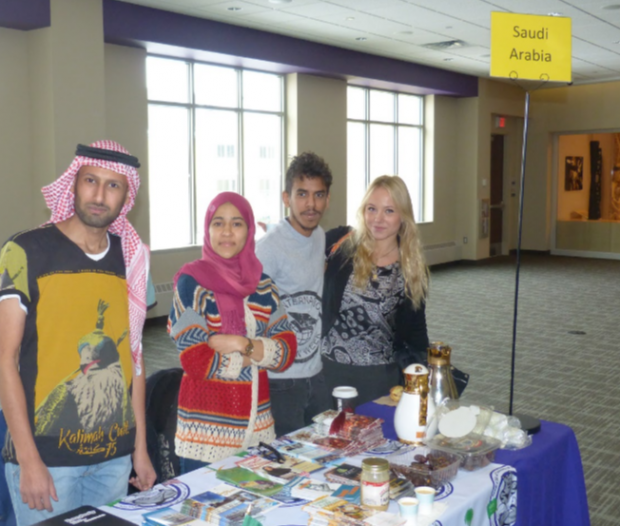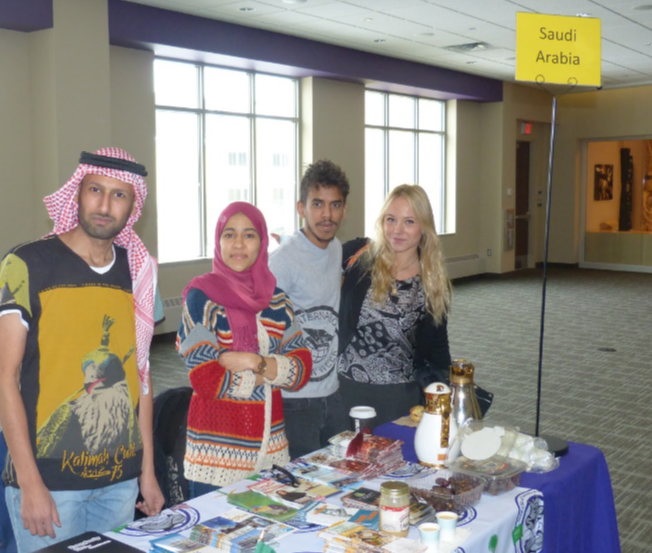
The Saudi Arabian government sponsors hundreds of students to study at universities around the world every year through a scholarship monitored and provided by the Saudi Arabian Cultural Mission, but recent economic pressures and changes in leadership are leading to potential budget cuts and acceptance restrictions, which may negatively affect St. Thomas’ Saudi Arabian student population.
With its economy dependent on oil and taxed by the war in Yemen, Saudi Arabia’s budget is under enormous pressure to cut costs. The government has been forced to tighten the rules of the $6 billion given to students, limiting it to those attending one of the top 100 universities globally or studying a program rated in the top 50 in its field, according to CNN.
Saudi Arabia is currently the most-represented country at St. Thomas among the international student population with 140 students, but this could soon change, according to the Director of International Students & Scholars Lori Friedman.
“St.Thomas is not one of the top 100 institutions worldwide,” Friedman said. “So (the) university may not be seeing the same number of Saudi students coming through the international scholarship program.”
Saudi students enrolled at the university study a variety of degrees including engineering, sciences, business and education. Current Saudi students at St. Thomas will keep the scholarship they already have but may be impacted if they apply for graduate school.
According to Insider Higher Ed reporter Elizabeth Redden, “Intensive English-language programs — the front line for many students coming to the U.S. — are reporting declines in Saudi student enrollments, and the Saudi government has sent signs that it wishes to make its scholarship program more academically selective and tie it more closely to the country’s labor needs.”
Friedman predicts diminished diversity and a loss of opportunity to share culture if fewer Saudi students have the opportunity to come to St. Thomas.
One student who has had that opportunity is Senior Muhannad Alkathiri. Alkathiri came to the U.S. with his sister, a King Abdullah Scholarship Program recipient. She entered the graduate program at the St. Thomas to study special education. Now, Alkathiri studies political science under the same scholarship.
Recently, however, Alkathiri has seen the changes to the scholarship impacting those around him. One of his friends, Latifa Alswaygh,is struggling to be accepted into the program because it requires a student to take 30 credits of school in the United States, which they pay for themselves before they can apply for the SACM scholarship.
Alswaygh planned to go the University of Minnesota but didn’t have enough money to finish 30 credits there without a scholarship. She now attends Century College, a cheaper option for her.
“The new changes in SACM scholarship impacted negatively on me, my dream even my family,” Alswaygh said. “I postponed my dream that to be a student at U of M, and I have started in community college … Hopefully, I can get the scholarship soon.”
The scholarship program was created by the late King Abdullah in 2005. According to KASP, “The program was founded in 2005 and covers full tuition, medical insurance, a monthly stipend for living expenses and an annual round-trip airfare for undergraduate, graduate and doctoral students. Previously, there were few restrictions on where and what Saudis could study.”
“The program, aimed in part at reducing widespread hostility in the Saudi public toward the United States, has reversed a steady plunge in Saudi students here that started immediately after the Sept. 11, 2001, terror attacks,” according to the The New York Times.
The SACM website states: “The objectives of the Saudi educational policy are to ensure that education becomes more efficient, to meet the religious, economic and social needs of the country and to eradicate illiteracy among Saudi adults.”
“At that time Saudi students would apply to be admitted to the scholarship program. They would be funded by the Saudi government to come to the U.S. and at that time it would give funding for English study and then funding for the degree,” Friedman said.
One factor contributing to the scholarship’s changes is the transition to King Salman on January 23, 2015. Since then, many changes have been proposed for the scholarship, including more selective GPA criteria, restrictions on credit load and where students apply for it.
In 2015, the Saudi government rolled out a new slogan, Your Job and Your Scholarship, to reflect a new strategy of tying scholarship awards to employment offers in the kingdom after graduation, according to Insider Higher Ed.
“There are a lot of people in Saudi who want that chance but they can not get it,” Alkathiri said. “Now they are selecting from the top … that will be really bad for a lot of universities in the United States.”
Alkathiri added that it will make things even more challenging for students who must not only have top credentials, but also be accepted by top universities.
Senior Ali Alibrahim, a Saudi student at St. Thomas, thinks that not only will it be more challenging for future students to be accepted into the program but that the program will be cut completely in the near future.
“My personal thought is that the studying abroad program is coming to an end,” Alibrahim said. “It is much harder nowadays to get (a) scholarship compared to what it used to be.”
The scholarship changes are attributed not only to new leadership but also the economic instability the country is facing, specifically the war in Yemen and Saudi Arabia’s dependence on oil.
The kingdom has been spending more than it takes in and by some estimates could exhaust its $640 billion in foreign exchange reserves by 2020 unless it makes deep spending cuts, a raises the price of oil or a combination of both, according to the New York Times.
St. Thomas geology Professor Thomas Hickson noted that the global drop in oil prices has been hurting the Saudi economy.
“If you look at the figure from the New York Stock Exchange below you can see that the price really started to drop in the middle of 2014,” Hickson said referring to a graph of declining oil prices. “This is a global average, but the same trend would apply inside of Saudi Arabia.”
Saudi Arabia possesses 18 percent of the world’s proven petroleum reserves and ranks as the largest exporter of petroleum, according to Organization of the Petroleum Exporting Countries. The oil and gas sector accounts for about 50 percent of gross domestic product and about 85 percent of export earnings.
“I think our real problem is that our economy was dependent on oil, and it made our economy go really bad especially with the price going down,” Alkathiri said.
As for possible causes for the drop in the price of oil, Hickson said the overall demand for oil has flattened out causing the price to go down as well as the increased production of oil in the U.S.
“What this means is that we did not have to buy oil, or not as much oil, on the international market or from countries like Saudi Arabia,” Hickson said.
At the same time its revenue has slowed, Saudi Arabia has increased military spending, financing rebels in Syria and intervening in Yemen, where Saudi warplanes have been bombing the insurgent Houthi movement since March.
“Things (in the economy) went really bad when we entered the war with Yemen because it has cost a lot,” Alkathiri said.
The economic pressures coupled with the new monarch’s changes to the scholarship program leave many Saudi students uncertain about the future of the scholarship program that was brought them across the globe.
“Good luck for the next students. I wish them really good luck,” Alkathiri said.
Emily Sweeney can be reached at swee4225@stthomas.edu.



